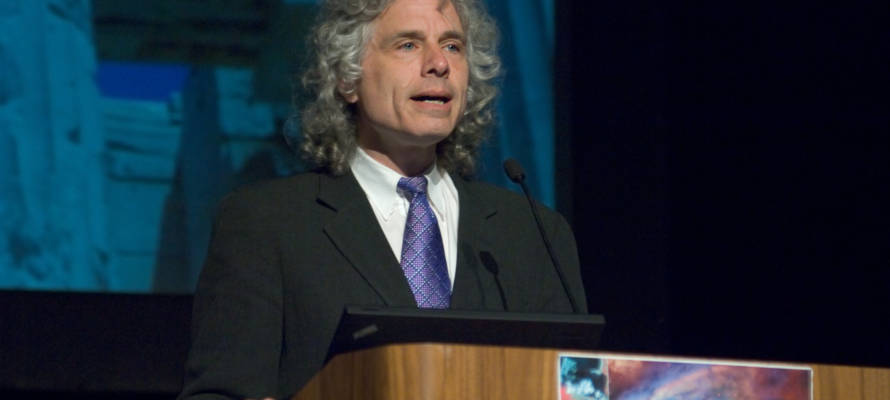Well-known Harvard psychologist Steven Pinker again voiced his opposition to academic boycotts of Israel last week, as two groups of anthropologists geared up campaigns to defeat the boycott resolution before the American Anthropological Association (AAA), to be voted on beginning April 15.
Steven Pinker, psychologist and best-selling author, who previously spoke out when Harvard University Dining Services (HUDS) banned the use of Israeli SodaStream water systems, released a statement entitled “Against Selective Demonization,” writing,
[Are Israel’s] policies really so atrocious, so beyond the pale of acceptable behavior of nation-states, that they call for a unique symbolic statement that abrogates personal fairness and academic freedom? It helps to put the Israel-Palestine conflict in global and historical perspective—something that anthropologists, of all people, might be expected to do … Why no boycotts against academics from China, India, Russia, or Pakistan, to take a few examples, which have also been embroiled in occupations and violent conflicts, and which, unlike Israel, face no existential threat or enemies with genocidal statements in their charters? In a world of repressive governments and ongoing conflicts, isn’t there something unsavory about singling the citizens of one of these countries for unique vilification and punishment?
Pinker’s statement was published on the website of one of the two groups of anthropologists campaigning against the AAA’s boycott resolution.
Members of this group, an anthropologist active in the AAA debate told The Algemeiner, “are mostly concerned with the freedom of speech and expression issues within anthropology.”
Called “Against Anthro Boycott” (AAB), their website describes their motivations as follows:
We are concerned that, while seemingly in service of justice for Palestinian academics and attempting to preserve a separation between Israeli academics and their institutions, the boycott will in fact have a pernicious effect by restricting academic freedom and exchange, endorsing discrimination on the grounds of ethnic and national identity, and breeding distrust and hostility within the AAA.
After offering arguments against the specifics of the boycott resolution, they note:
University of Chicago President Robert Zimmer [states]: academic boycotts are an “assault on the fundamental principles of open discourse, exchange of ideas, and free argumentation, principles that lie at the very foundation of the academy and its missions of discovery, search for understanding, and education.” It is thus little wonder that academic boycotts have been rejected by the American Association of University Professors (AAUP) and by more than 100 major higher education institutions across the country …
A second group, according to the anthropologist with whom The Algemeiner spoke, “is a coalition of liberal left Israeli and American academics that oppose both the occupation and the boycott for multiple reasons.”
Called “Anthropologists for Dialogue on Israel & Palestine” (ADIP), their website states that, while they are critical of Israel’s “occupation of Palestinian lands” and its “settlement project that continuously jeopardizes possibilities for peace,” they nevertheless oppose the boycott resolution for several reasons:
An academic boycott will not help the Palestinian cause, but it will erode our discipline’s professional ethos. An academic boycott is a political action that rests on absolutist positions rather than probing analyses. Despite its claims, such a boycott fails to distinguish between institutions and individuals. An academic boycott compromises academic freedom by censoring professional colleagues on the basis of their place of employment. It works symbolically and materially to create boundaries of exclusion from the moral community of scholars based on criteria that are disconnected from academic standards.
They conclude:
ADIP proposes that rather than disengaging from the region through a boycott, the American Anthropological Association and all anthropologists should increase engagement through the promotion of research, teaching and academic dialogue.
At the AAA’s annual meeting last November, members voted overwhelmingly to place the boycott resolution on the upcoming ballot, with 1,040 in favor and 136 against. The President of the AAA, Alisse Waterston, last month released a statement urging participation of the organization’s 10,000-plus members in the vote, noting that “It is very important that the election results are representative of the entire membership.”
The text of the resolution may be found on the AAA’s website.
By: The Algemeiner

Do You Love Israel? Make a Donation to Show Your Support!
Donate to vital charities that protect Israelis and help inspire millions around the world to support Israel too!
Now more than ever, Israel needs your help to fight and win the war -- and also the battle of public opinion.
Anti-Israel bias and boycotts are out of control. Israel's enemies effectively use social media to incite brutal terror against innocent Israeli civilians. Please help us fight back!
See our Privacy Policy


